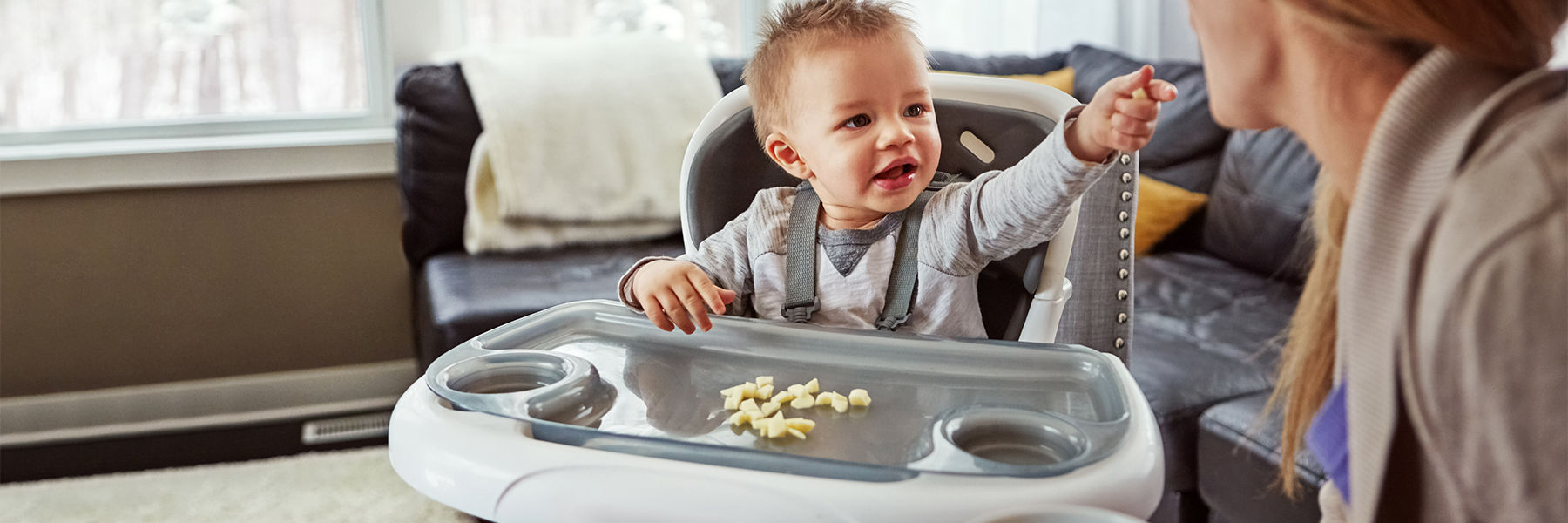Use arrow keys to navigate through the menu items. Use Tab key to navigate through the menu banners.
Baby Healthy Meals

Baby Healthy Meals
As your baby grows they’ll be ready to explore exciting new tastes, textures and finger foods
Giving your baby the chance to feed themselves sparks an interest in different tastes. Exploring the textures, colours, shapes and smells of foods can help to encourage little ones to eat them at meal times.
It also helps them learn different grip techniques, and boosts their hand-eye coordination as they try to move that yummy piece of melon or sweet potato from hand to mouth!
From 6 months
If you decide to spoon feed your baby, start off with smooth purees. You can move on to mashed, lumpy foods and finger foods as soon as they can manage them. Some parents prefer to let baby feed themselves from the start (baby-led weaning). Always closely supervise your baby in case of choking.
At six months, it’s important that any finger foods you offer are super-soft and squishy, so they melt in your baby's mouth. Make them long enough to peep out of your baby’s little fist and chunky enough to munch on safely.
You’ll need to cook most veggies to soften them; steaming preserves more of the nutrient content than boiling. Offer a variety of vegetables, including ones with a bitter flavour such as broccoli, green beans and courgette.
Offer baby sips of water from an open or free-flow cup which will help them learn how to sip. At this stage, food isn’t a replacement for your baby’s usual milk.
From 7 months
By seven months old, your tot will be picking up different shaped finger foods and trying foods with more textures. Between seven to nine months, you can start to transition your baby to three meals a day (breakfast, lunch and tea).
Offer a variety of different foods including protein sources (such as meat, fish, cheese, lentils) so your little one gets enough energy and nutrients (such as iron), and eat meals together as often as you can – your baby learns from watching you eat.
From 9-10 months
From 9-10 months, little ones are starting to master the “pincer grip” and learning to pick up smaller pieces of food with their fingers. You could try giving them halved blueberries or raspberries to really get those fingers and thumbs working! Finger foods can also be a little firmer, especially if little teeth are coming through.
Little ones love being in control and as they get more confident, you can offer more and more finger foods, like bread fingers, hard-boiled egg slices or avocado slices.
Snack ideas
Small cubes of cheese are a good source of calcium, and provide a challenge for baby-led weaning as your little one learns to pick up and direct food towards their mouth.
For more variety try toast, pitta bread or chapatti cut into small fingers, along with plain bagels, unsalted and unsweetened rice cakes or plain, unsweetened yogurt.
Ripe fruit, such as peeled pear, peach or banana, is good for snacking on, as are canned pieces of fruit in fruit juice.
As your baby gets older, try giving them carrot sticks, slices of pepper and peeled apple. You could even put their favourite veggies or slices of canned pineapple on top of a pizza.
Popping chopped fruit into cereal or plain, unsweetened yogurt is an easy way to boost your baby’s fibre and vitamin intake.
Lunch and dinner ideas
Sitting down and eating a meal with your baby is a great way to encourage them to try new and exciting tastes and textures.
As your baby approaches the age of one, try serving them family meals like cauliflower cheese with cooked pasta, mashed pasta with broccoli and cheese, reduced salt and sugar baked beans with toast, or scrambled egg with toast, chapatti or pitta bread.
You could also give your little one cottage cheese dip with dipping sticks made from pitta bread, cucumber and carrot.
As they get more adventurous then dinners such as shepherd’s pie with green vegetables, mashed cooked lentils with rice, mashed canned salmon with couscous and peas or minced chicken and vegetable casserole can all go on the menu. Never add salt or sugar to your baby’s food or cooking water though – salt can harm their developing kidneys and sugar can cause tooth decay.
It’s also worth remembering that your little one may need 10 or more exposures to new tastes, textures, and foods before they get comfortable with them, so keep persevering.
Accept that there will be days when they eat more, and days when they eat less. It’s all part of the weaning journey.
Help & Customer service
- Help Centre
- How to shop
- Product recalls
Payment Methodslist with 8 items
- Asda Group of Companies
- Modern Slavery Statement
- Electrical Waste Recycling
- Terms & Conditions
- Customer Review Policy
- Privacy Centre
- Cookie Settings
- Accessibility
© ASDA 2025